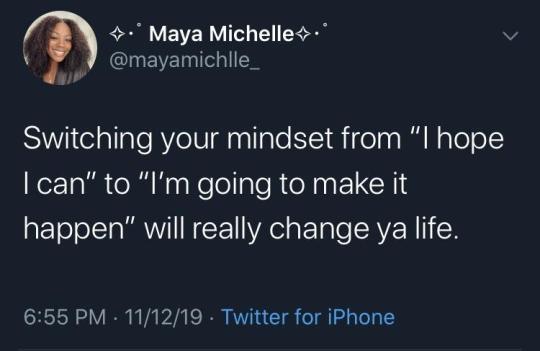Photo
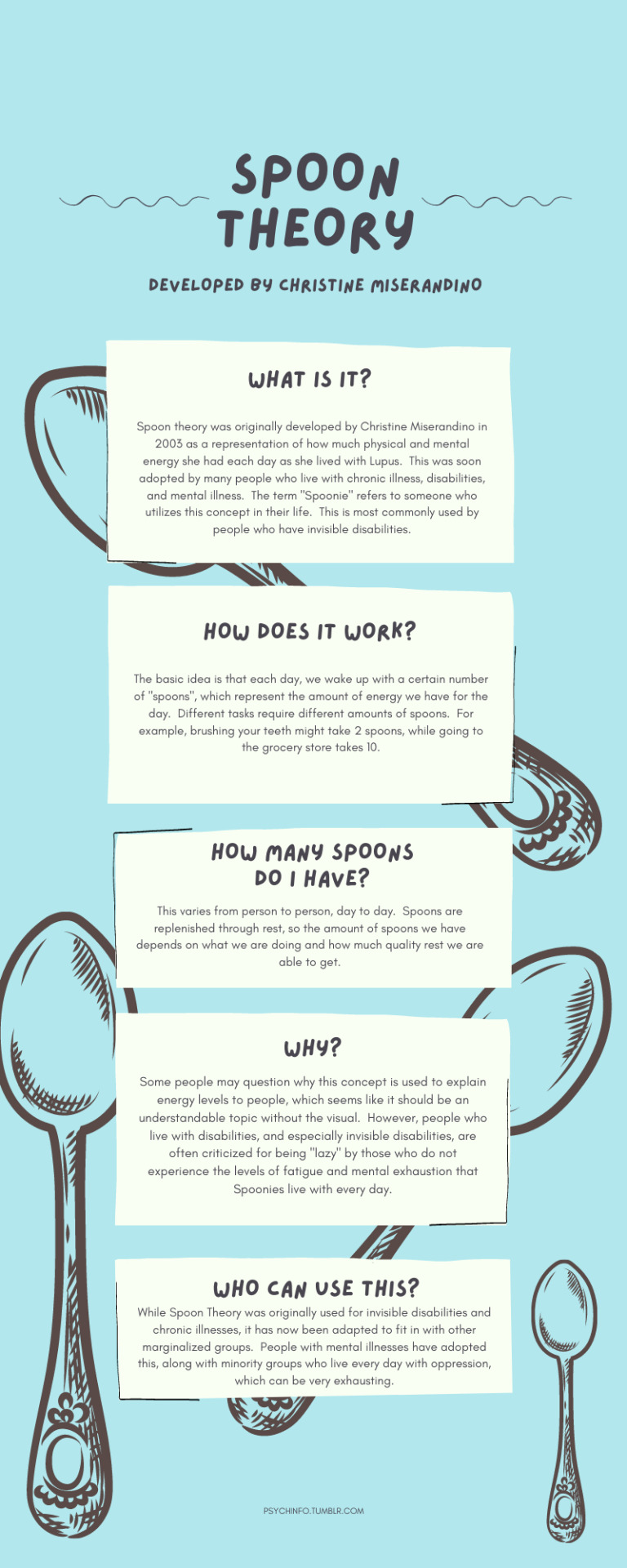
As a Spoonie myself, I have found this theory to be very helpful when explaining to various people in my life why I sometimes struggle to do as much in a day as they can. When you live with an invisible disability (or another struggle that causes fatigue and/or mental exhaustion), you get a lot of criticism for being “lazy”, when in reality we just have lower energy levels!
I’d love to hear your stories about living with chronic illness or anything else in which you’ve found Spoon Theory to be helpful!
53 notes
·
View notes
Photo
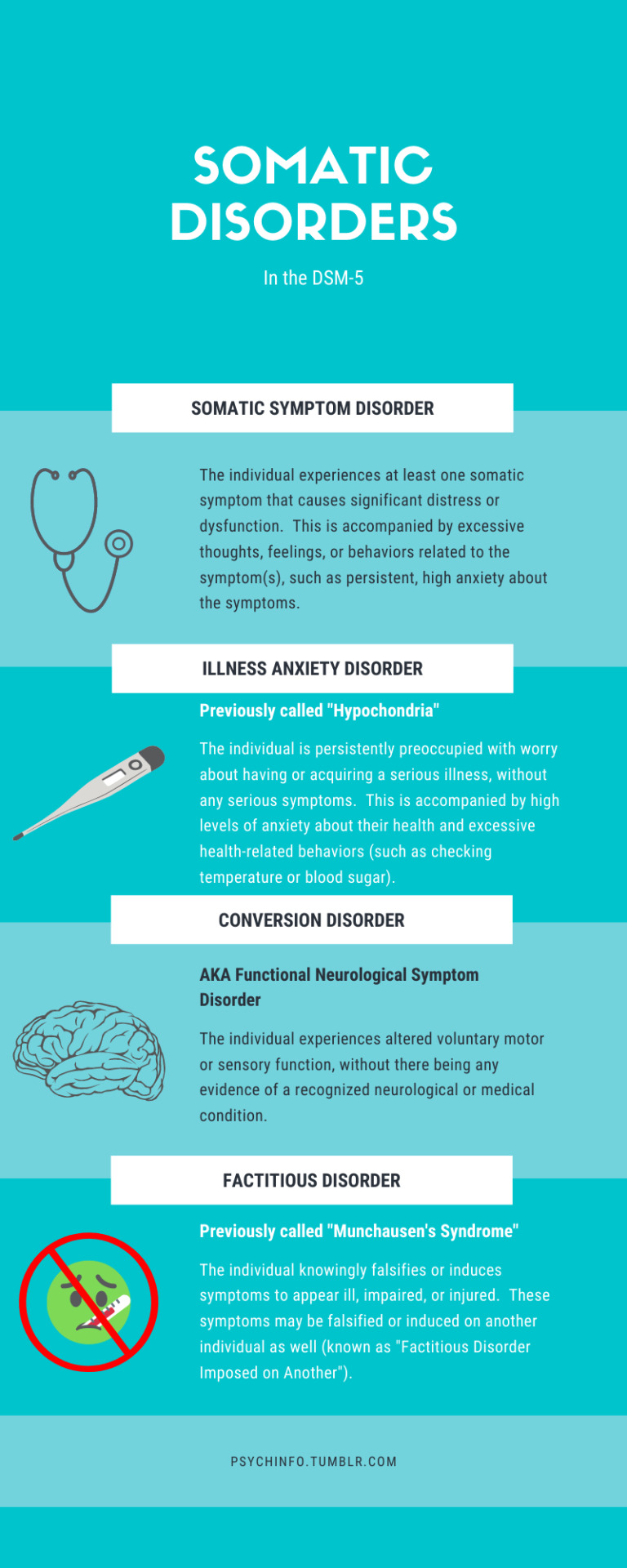
Somatic disorders may be diagnosed in cases where people are experiencing physical symptoms with no identifiable medical cause. It’s very important to note that in Somatic Symptom Disorder and Conversion Disorder, the individual is experiencing very real symptoms that often cause significant distress. Somatic disorders are one way that we are able to see that the body and mind are connected and have heavy influence on each other!
Want to see more? Check out my other DSM-5 posts by clicking the links below!
Paraphilic Disorders
Personality Disorders
Disruptive, Impulse Control, and Conduct Disorders
Feeding and Eating Disorders
Critiques of the DSM-5
#somatic disorders#somatic#somatic symptom disorder#illness anxiety disorder#hypochondria#conversion disorder#functional neurological symptom disorder#factitious disorder#munchausen syndrome#munchausen by proxy#factitious disorder by proxy#factitious disorder imposed on another#tw: mental illness#psychology#clinical psychology#clinical mental health#psychblr#psych
125 notes
·
View notes
Photo
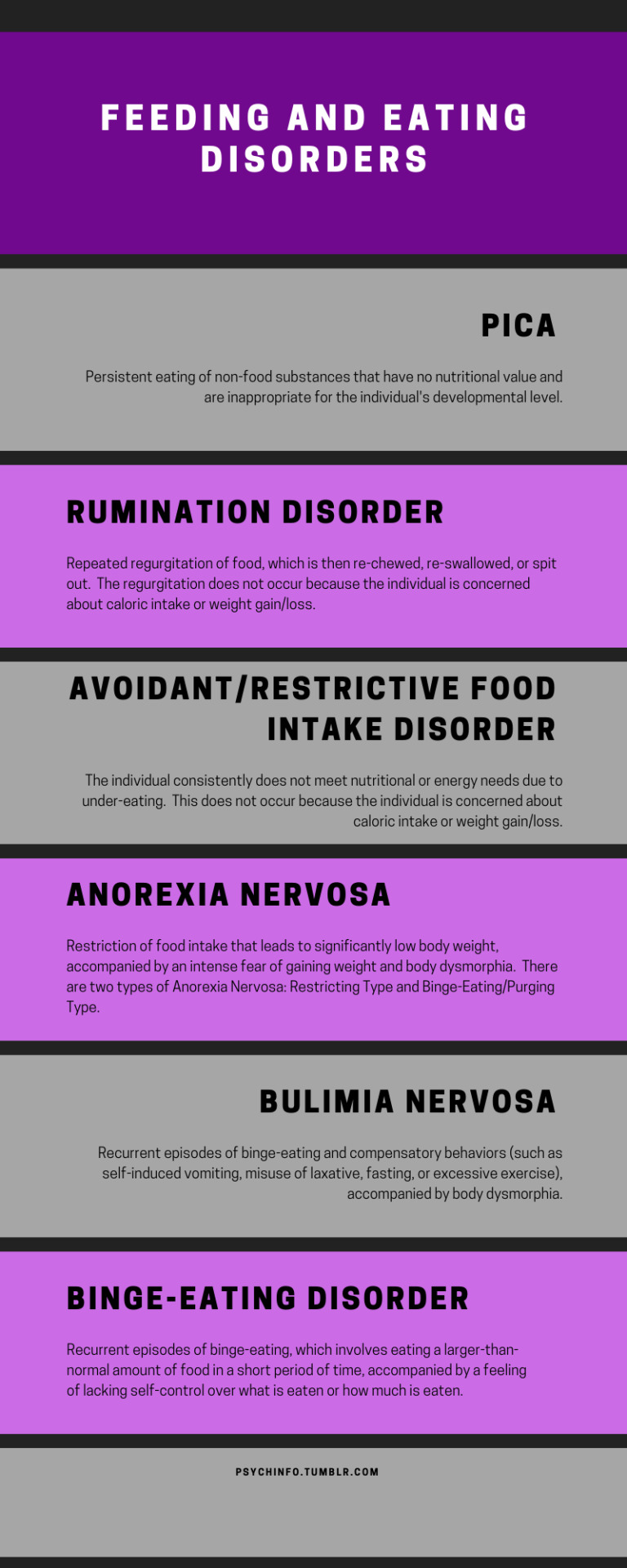
If you or someone you know suffers from an eating disorder, please consider calling the National Eating Disorders Association Helpline at 1-800-931-2237 or texting NEDA to 741741.
Not receiving proper nutrition can be detrimental to one’s health and cause lifelong health problems, and can be fatal if not addressed soon enough. I urge you to watch for unhealthy eating habits in those around you.
Keep in mind that not all eating disorders are related to body dysmorphia or fear of weight gain, though these are diagnostic criteria for Anorexia Nervosa and Bulimia Nervosa.
#tw: eating mention#tw: eating disorder#tw: eating habits#tw: eating problems#tw: anorexia#tw: bulimia#tw: food#eating disorder#eating disorders#feeding disorder#feeding disorders#pica#rumination disorder#avoidant/restrictive food intake disorder#anorexia#anorexia nervosa#bulimia#bulimia nervosa#binge-eating disorder#binge-eating#mental health#dsm-5#clinical psychology#mental illness#tw: mental illness#tw: mental disorder
16 notes
·
View notes
Photo
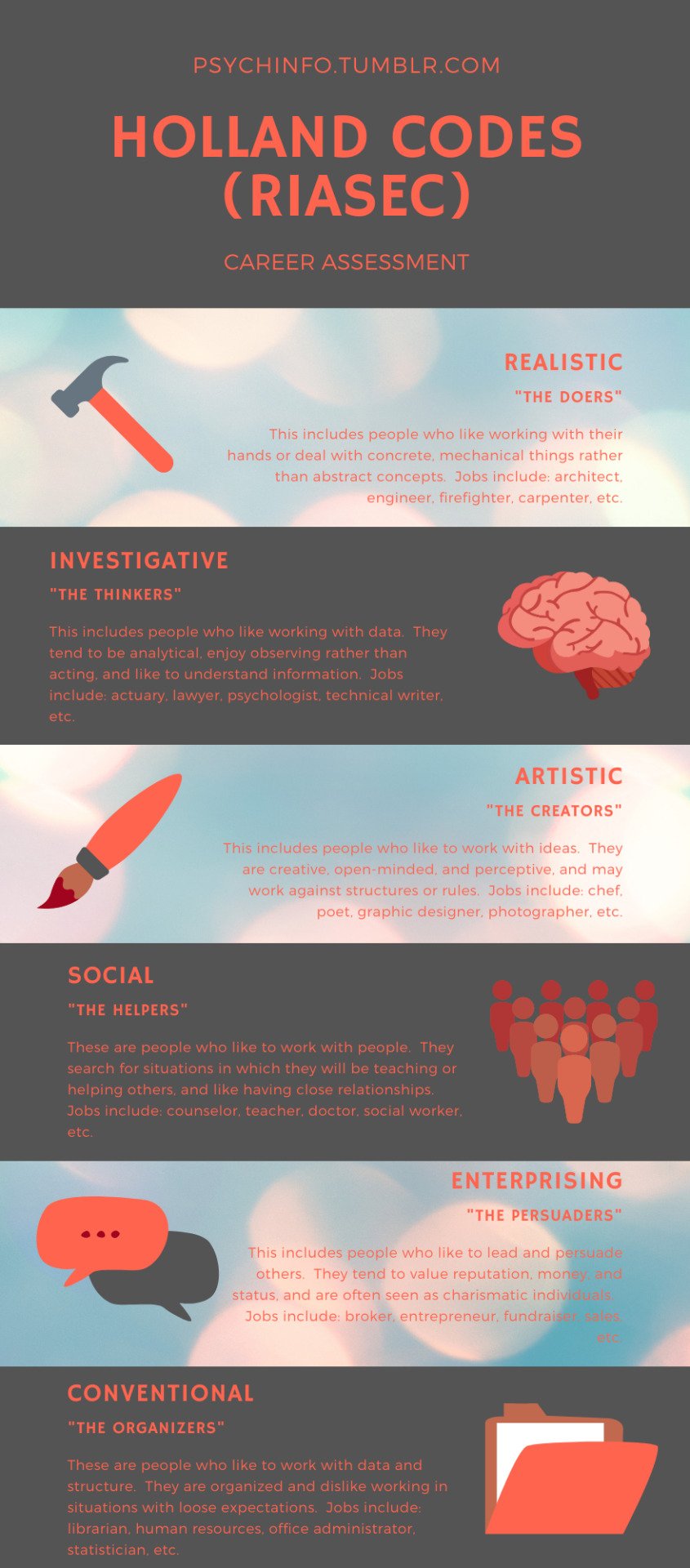
Have you ever struggled with finding the right major or career path for yourself? Try taking a Holland Code test! Developed by John L. Holland, tests that use Holland Codes look at your personality and interests to suggest a wide array of careers that might be a good fit for you. After taking the test, you are given a 3-letter code, made up of the letters RIASEC (see above for an explanation of each letter). Different combinations indicate different fields/careers that might be a good fit!
For example, my code is SAI - Social, Artistic, Investigative. The combination of these three “traits” means like I like working with people, I like being creative, and I like to be analytical and work with data. This combination means that careers such as counseling or teaching would be ideal for me!
One nice thing about this type of test is that you often end up with a variety of jobs that require different educational requirements, offer different pay, and allow you to examine your own skills, interests, and values as you consider the results.
You can take a version of this test here!
#psychology#psychblr#psych#career#career counseling#career assessment#holland code#holland codes#john l holland#realistic#investigative#artistic#social#enterprising#conventional#riasec#career test
50 notes
·
View notes
Photo
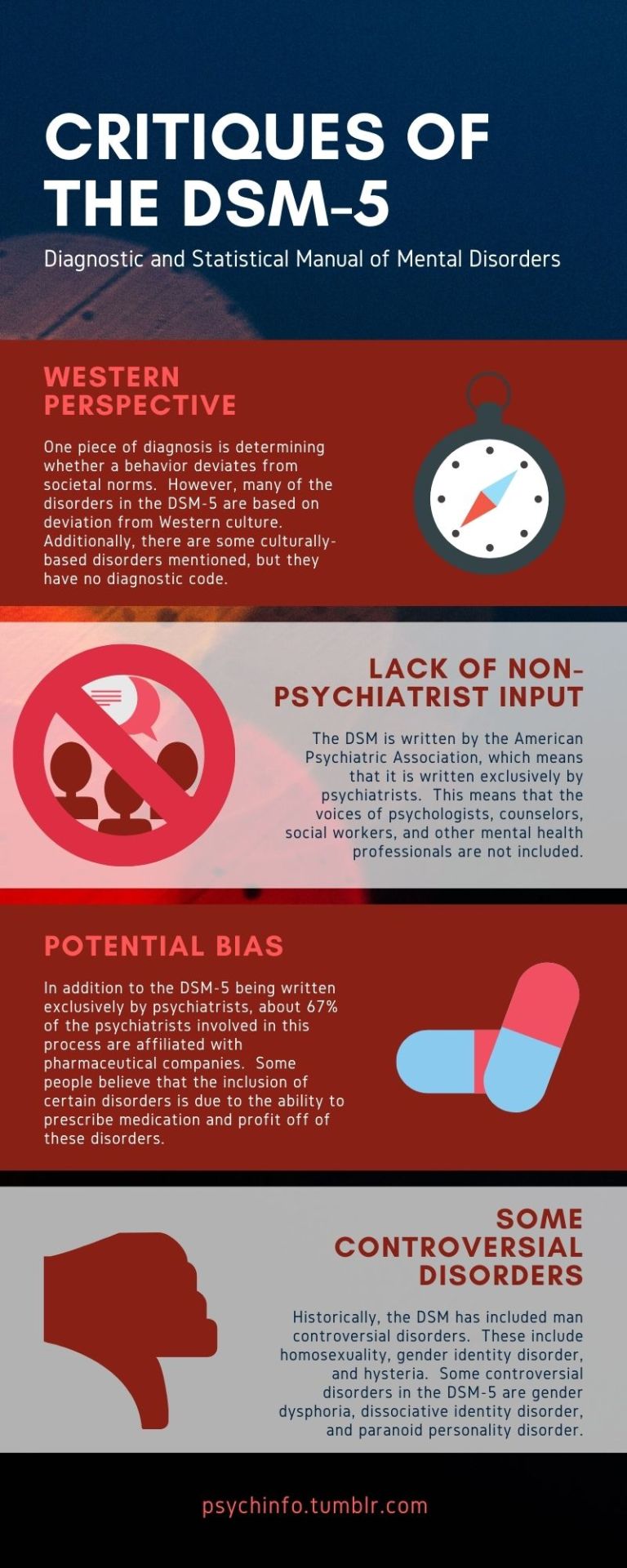
Critiques of the DSM-5
Since I have done a few posts now discussing DSM-5 disorders, I wanted to also make a post about some of the criticisms that exist for the current diagnostic system.
Many of the disorders have been identified based on Western standards of “normal” behavior. Some disorders have been shown to manifest differently in different cultures, but this makes it difficult for people of these cultures to reach a diagnosis. This is especially important in countries like the USA, where a diagnosis is required in order for insurance to reimburse mental health services. If you want to learn more about this, I recommend the book Crazy Like Us: The Globalization of the American Psyche by Ethan Watters.
The DSM is written by the American Psychiatric Association, which leads to some other concerns. First, the DSM is written exclusively by psychiatrists, and does not include the input of psychologists, counselors, social workers, or any other mental health professionals. In addition, about 67% of the people involved in the Task Force for the DSM-5 have ties to the pharmaceutical industry. This has led to concerns over the intent of the DSM-5. Is is meant to help us, or is it meant to help the writers profit?
Finally, the DSM has historically contained many disorders that are controversial. While some of these have been removed (such as homosexuality) or changed (such as gender identity disorder, now called gender dysphoria), there are still many problematic disorders included. I mentioned paranoid personality disorder, which is disproportionately assigned to Black men due to distrust of the US Justice System despite this not being due to irrational paranoia but rather years of systemic oppression and unjust incarceration, torture, and death.
Of course, the DSM-5 and the diagnostic system does have its benefits as well. Proper diagnosis leads to better mental health treatment and can guide professionals as they determine a treatment plan. It can also help us better understand ourselves and help eliminate feelings of guilt regarding ways that we think or behave.
Overall, the DSM-5 has always made me think of a weapon in an action movie - in the hands of right people, it can be an excellent tool that is used to help many, but in the hands of the wrong people, it can cause devastating harm.
#dsm#dsm-5#diagnosis#psychiatry#psychiatrist#psychology#psych#psychblr#mental health#mental disoder#mental illness#tw: mental illness#tw: mental disorder
142 notes
·
View notes
Photo
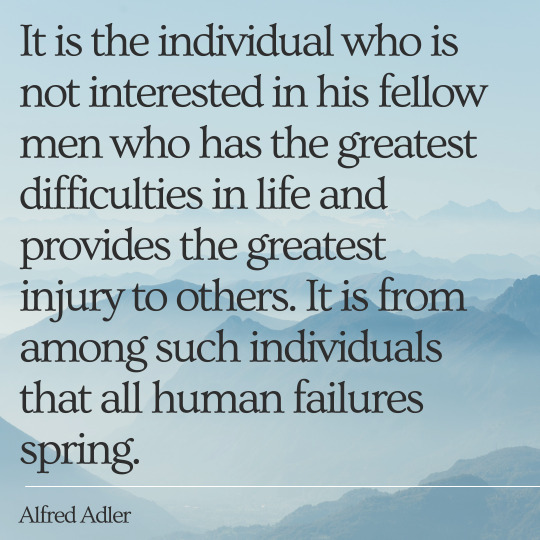
“It is the individual who is not interested in his fellow men who has the greatest difficulties in life and provides the greatest injury to others. It is from among such individuals that all human failures spring.” - Alfred Adler, What Life Could Mean to You
Alfred Adler is one of my personal favorite historical figures of all time, and his theories and quotes have seemed very applicable to recent events. Adler may be best known for his theory of Gemeinschaftsgefühl, AKA social interest/community feeling. Adlerian psychology teaches us that without prosocial behavior (things that we do to benefit others), we are unable to grow. An important piece of social interest is that it is active, not passive. It is not good enough to care about others or want to help - it is actually taking those actions to benefit others that will in turn benefit you!
If you’re interested, you can take a look at my post on Adlerian Theory in Counseling here. I’m also always happy to answer questions or recommend articles/books that you can read to learn more!
#adler#adlerian#alfred adler#psychology#psych#psychblr#social interest#social#prosocial#community feeling#community#gemeinschaftsgefühl
65 notes
·
View notes
Photo
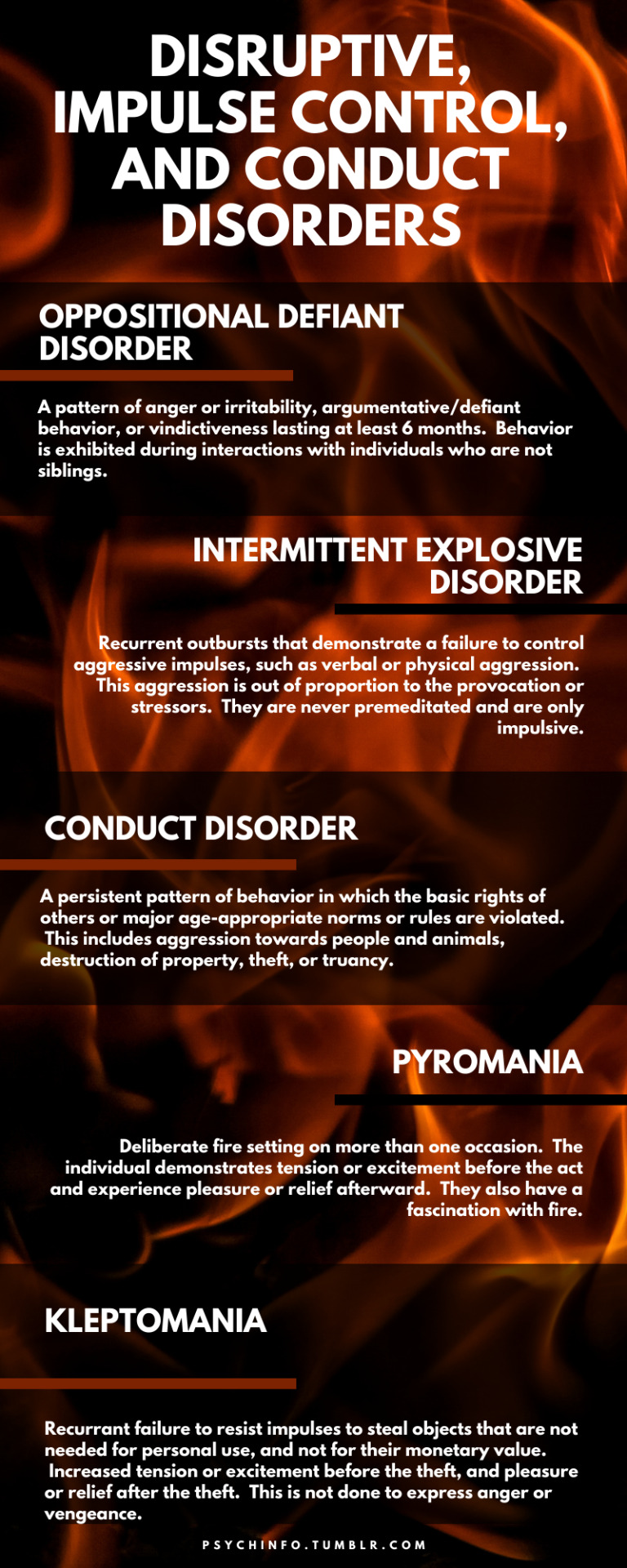
As a note, Antisocial Personality Disorder is also listed in this chapter of the DSM-5. That is because it is related to Conduct Disorder - you don’t qualify for a diagnosis of Antisocial Personality Disorder unless you met the criteria for Conduct Disorder by age 15!
What chapter would you like to see next?
You can see my previous DSM-5 posts here:
Paraphilic Disorders
Personality Disorders
#psychology#psych#psychblr#mental health#mental disorder#mental illness#dsm#dsm-5#conduct disorder#oppositional defiant disorder#intermittent explosive disorder#pyromania#kleptomania#antisocial personality disorder#antisocial#clinical psychology
111 notes
·
View notes
Photo
Epigenetics is a super interesting topic, and definitely important for all of us to understand. The really interesting part is that your maternal grandmother’s stress levels or other actions can affect your development, since your mother was born with all of her eggs (including the one that you came from!). While stress is one of the more commonly known factors in epigenetics (cortisol levels during pregnancy), other things to consider include smoking/other drug usage and diet!
If you’d like to learn more, check out this TEDTalk video on epigenetics:
https://www.youtube.com/watch?v=JTBg6hqeuTg&t=561s

scientist voice: today i will be a dick to this cricket
148K notes
·
View notes
Photo
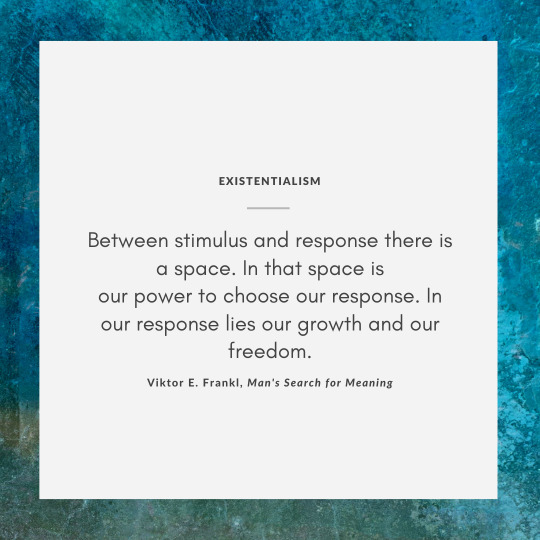
#existential#existentialism#existential theory#existential therapy#frankl#viktor e frankl#viktor frankl#freedom#responsibility#existentialist#choice#choose#man's search for meaning#meaning#meaningfulness#meaningless#meaninglessness#psych#psychology#psychblr
73 notes
·
View notes
Text
How to Really Comprehend a Scientific Paper
**credit to my research advisor, she’s an amazing mentor and I aspire to be just like her someday :)
Read the abstract. Write down what the paper says it is going to be about.
Read the introduction. Write down what the paper says it is looking to accomplish and how.
Read the conclusion. Write down what the paper actually did accomplish.
Go through and find all the pictures, graphs, or diagrams. Write notes explaining these images to yourself.
Read the whole paper start to finish. Write a summary of the paper as though you are explaining it to a layperson, and then another summary as though you are explaining it to a colleague.
Throughout all of the above steps:
If there are words you don’t know google them and write down the definitions
If the paper defines a formula, law, variable, etc in a certain way write that down
If there are references to or recommendations of other literature write those down. After the last step if there’s anything you’re uncertain about or would like more information on look to that list for further reading
12K notes
·
View notes
Photo



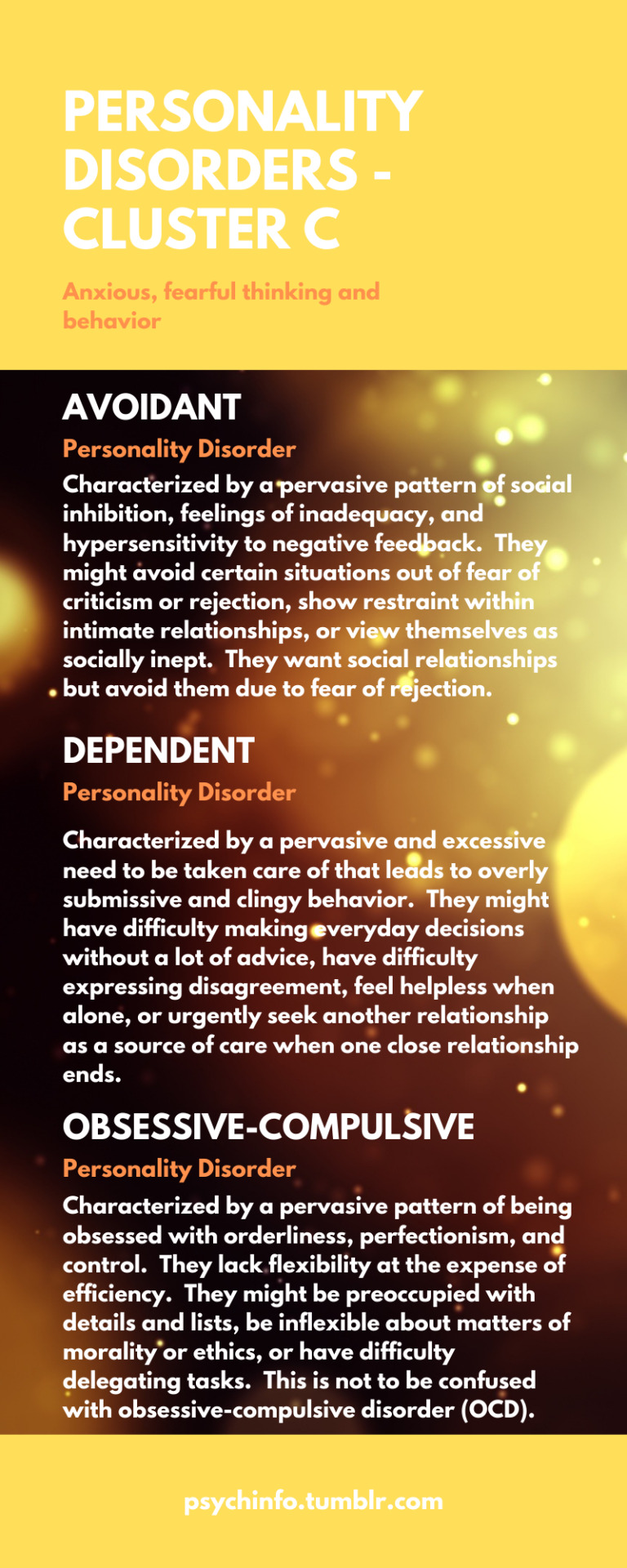
Personality disorders! In the DSM-5, Personality Disorders are divided into 3 clusters based on some similar themes in thinking and behavior. Cluster A is the “odd or eccentric” cluster, Cluster B is the “dramatic or overemotional” cluster, and Cluster C is the “anxious or fearful” cluster.
This is to me one of the more important chapters of the DSM-5 to understand because people throw around so many of the terms used in these disorders, which can cause a lot of confusion and stigma! Also, keep in mind that personality disorders shouldn’t be diagnosed until early adulthood at the soonest because all of them require a pervasive pattern of certain behaviors, which is difficult to establish while someone is still developing.
What are your thoughts about the different personality disorders? I personally have a few different thoughts/opinions about some of these disorders and the research that has been conducted on them, along with their histories!
What chapter would you like to see next?
#psych#psychology#personality#personality disorders#antisocial#borderline#histrionic#narcissistic#avoidant#dependent#obsessive-compulsive#paranoid#schizoid#schizotypal#personality disorder#psychblr#dsm-5#mental disorder#mental illness#psychopathology#clinical psychology
385 notes
·
View notes
Photo
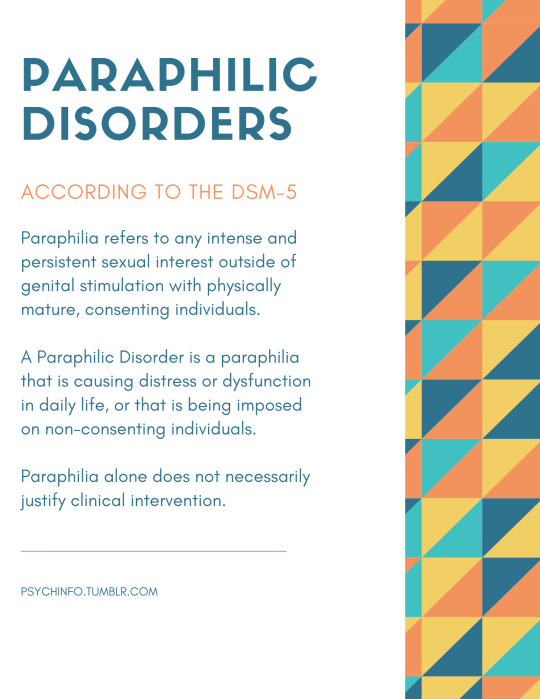

What are your thoughts on the paraphilic disorders listed in the DSM-5?
Requested by @hydrae7
Let me know which chapter you’d like me to cover next!
#dsm-5#dsm 5#clinical psychology#psychology#psych#psychblr#paraphilic#paraphilia#paraphilic disorder#paraphilic disorders#voyeuristic#exhibitionistic#frotteuristic#sadism#sexual sadism#masochism#sexual masochism#pedophilia#pedophilic#fetishistic#fetish#transvestic
27 notes
·
View notes
Text
Would anyone be interested if I did a series going through some of the chapters of the DSM-5? If so, what would be the most interesting to you?
24 notes
·
View notes
Photo

Personal update - I got married! I wasn’t sure if I was going to post anything (or especially a picture!) but I figured, why not? It’s been a little over a month now, and I’m finally starting to feel settled into married life. It was certainly difficult to plan a wedding during a global pandemic, and it may not have been what I expected my wedding would be like, but it was perfect nonetheless!
As another update, I also got a promotion at work! I’m moving from part-time to full-time (in addition to being in grad school - yikes!) so if I’m less active on this page, please keep in mind that I have a lot going on right now between transitioning into a new job, training, and settling into my second year of classes.
I also want to assure everyone that my wedding was conducted with safety in mind, including small numbers, being outdoor-only, social distancing, and avoiding physical contact with guests.
Photo Credit: Jackie Whitaker Photography
14 notes
·
View notes
Photo
These are some great tips! I really want to emphasize those last two points - don’t be too hard on yourself while you’re sick if you can avoid it! My last semester of undergrad, I had mono, but I was still going to class/doing homework/studying like nothing was wrong. I was talking about it with a friend the other day and I realized that I have almost no memory of my last two months of school because I was either studying or asleep. While I’m proud of myself for my academic accomplishments, I definitely wish that I had given myself the chance to rest (I’m fortunate that my professors did force me to slow down for a little while, at least) because I probably would have recovered sooner and been able to enjoy my last little bit of school.
Of course, that’s a more extreme example. There may be days when you just feel off or icky, and while you should still take care of yourself, these are good ways to help not feel overwhelmed with work once you are feeling better!

How to Study when Sick
A week or so ago I fell sick and of course I still had a mountain of work to do, so during that time I found a few things that helped me when studying while I was sick. Without further ado here are a few tips on how to study when sick…
Before studying
Fluids
When you’re sick, your body needs fluids! Sometimes water can taste really gross when you have a sore throat so grab some tea; either herbal tea or good old English breakfast or try some hot water with lemon and honey; it does wonders for the throat! Make sure you have a big old cup next to you that you can grab for often.
Comfort is key
Dress comfy for your study sess! If that means your daggy sweatpants and oversized jumper or even pyjamas, do whatever is going to keep you warm and comfortable. But not too comfortable where you will fall asleep haha.
Eye drops
If you need to use computers while you’re sick make sure to have some lubricating eye drops on hand! You don’t want to get sore, tired eyes or even a headache when your body is already run down.
Gather supplies
Gather what ever supplies you will need when your studying. Here’s a list of some things might be helpful (of course just get whatever works best for your sickness!) :
What you are studying! (Flash cards, notes, computer)
Stationary (highlighters, pen, white out, ruler, sticky notes)
Tissues
Blanket
Cough drops
Tea/fluids
Snack
Medication
Deep heat
Hot water bottle
Hand sanitiser
Eye drops
Nasal spray
Humidifier
When studying
Small tasks
Do small tasks that require less brain power, so you don’t over exert your brain. Think easier tasks like flipping through flashcards, writing flash cards, organising notes, re-writing notes, planning your week, compiling lecture notes with textbook notes, making quizzes for yourself, an easy work sheet or going through last week’s class content.
Set timers
Set timers for when to take breaks and medication. You could even try using the Pomodoro technique to keep you motivated and productive.
Have a small do to list
Along with doing smaller easier tasks, have only a small to do list or maybe 2 – 4 items that will only take you 1 – 3 hours to complete in total, depending on how well you are feeling. By doing this you will feel more motivated to complete the small to do list as you know the tasks are simple. Additionally, by adding in breaks or using Pomodoro you are taking extra precautions against working to hard which will slow down recovery.
Ambient study sounds
The best thing I found to help me stay focused is to listen to ASMR ambient sounds. I found some great channels that make ASMR ambient sounds based on different rooms from movies, tv shows and books. Here are my two favourite channels ASMR Rooms & Story Ambiance. Some of my favourite videos (all harry potter themed, so I can feel like Hermione haha) are Hogwarts Library, Studying in the Great hall, Gryffindor Common Room, Potions Classroom and Sitting in a Hogwarts Class.
After studying
Make a to do list for tomorrow
After you have finished everything from today, make a to do list for tomorrow. This is an opportunity to brain dump anything in terms of school that you are worried about completing and gives you direction for the next day.
Have something to look forward too after your session
Have something planned after your study session that will be relaxing and enjoyable. Something like watching a movie, reading a book, calling a friend, watching a YouTube video; basically, anything you enjoy and look forward to doing. This can act to motivate you to get work down yet also be a much-needed winding down reward for you brain and body.
Take a nap!
You worked hard, made a dent in your to do list and feel productive so take a nap! Your body needs to rest so give it what it needs and take a nap. This will help your body recover quicker and will help your mind to relax from working for a long time.
Extra tips
Be easy on yourself
If you only complete one item before getting too tired, or if you couldn’t even complete one to-do, then that’s fine! Have some self-compassion and realise that you’re sick and won’t be able to be as productive as normal. Once when I was sick, a task that took me normally 45 minutes to do took me 2 hours because my brain was so foggy, and it was hard to concentrate. You’re not alone in being unproductive, we all go through it went sick and run down.
Don’t overwork yourself
Nothing is worse than over working yourself when you are sick, it will only make you stay sick for longer! Do not push your self to be a productive super human when your body can’t handle it, its only going to make you less productive in the long run
I hope some of these tips help you for when you need to study whilst sick, have a head ache or are just run down. Take care of yourself and remember not every day can be productive : )
2K notes
·
View notes
